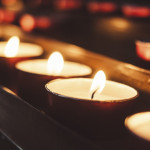“Can you send me what you said about PTSD,” my friend Jimmy Paul said recently after seeing David’s Friend, the show I’m doing about my best friend David, who died of AIDS in 1993, “because I keep thinking about it.” I emailed him: “For those of us who lived through the age of AIDS, the PTSD—the posttraumatic stress disorder—is wearing off, and there’s a collective sense of mourning, a realization of our losses, losses we were too young or overwhelmed to fully take in, goodbyes we never got to say and ‘I love you’s that came too late.”
While the show is a celebration of David and our friendship, I originally started working on it because I couldn’t figure out why the death of my friend, whom I had mourned over the years, was suddenly hitting me so hard. In the two years I have been putting this show together, I have not been able to get through a writing session, rehearsal or performance without breaking down—and it’s a comedy! Something is going on, and I’m not alone.
As I’ve done the show nationwide, in addition to young people, both straight and gay, male and female, responding to it, after every show, I am approached by tearful middle-aged men and women saying they are going through the same thing. Why? Why now?
My father moved to America from Germany in 1960, traumatized and guilt-ridden by the Holocaust. He started a German/Jewish discussion group and helped organize the Holocaust Week at his university. He used to talk about why it took so long for Jews and Germans to acknowledge what happened and how important it was that the stories not be lost. It wasn’t until the mid-1960s that people began to really pay attention to what had happened 20-plus years earlier. I think we’re seeing the same thing today with AIDS; the height of the epidemic was over 20 years ago, but we spent so many years in shock, unable to process what we had been through, that only now are we ready to face what we lost. I remember my mother being horrified at how many of my 20-something friends were dying, but to me it had just come to seem normal.
I’m in my mid-50s now. My children are getting older, my back is achy and I have friends dying of old-fashioned things, like cancer and heart attacks. In other words, I’m aging, normally, something that David and so many of our friends never got to do. We all thought we’d be able to sit in our rockers together, listening to Grace Jones and talking about the good old days, but AIDS took many of our friends—and, with them, our shared history.
I’ve changed so much in the 23 years since my best friend died. How much we missed together and how much he’ll never know about me breaks my heart.
Every generation has its tragedy: WWII, the Holocaust, Vietnam, but the AIDS epidemic was unique. It struck our community hard, but because of it, we became a strong community. Lately, there’s been a swell of recognition for this era, for the amazing ACT UP warriors and organizers and caregivers and people whose stories have been forgotten or never got told. David France’s How to Survive a Plague is a best seller and “the_aids_memorial” is trending on Instagram. I have to admit, although I went to a few marches and protests, I was never really in the trenches. I was young, and my life was going on.
But I had a wonderful friend, this amazing person named David, who died before he was able to turn into the man he was destined to be. So I’m telling that story—about him and us and our lives in New York City, in the hope that it gives him more time on this planet that he left, like so many others, far too early.







Comments
Comments